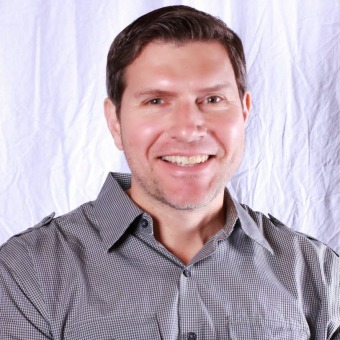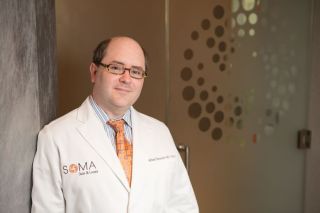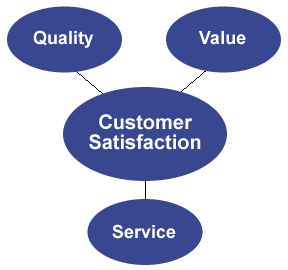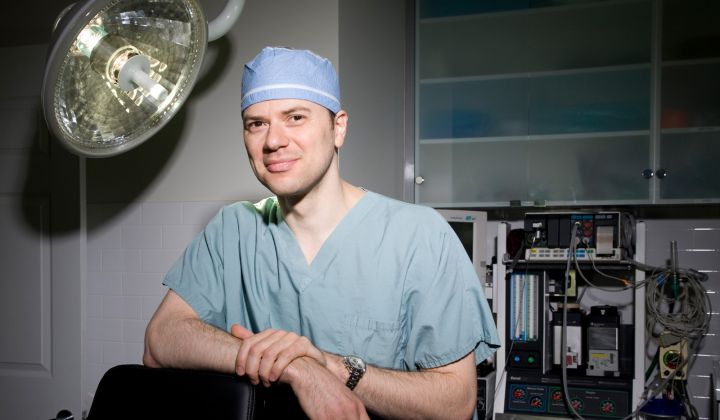5 Lessons We've Learned About Building A Successful Cosmetic Practice
/John D. Rockefeller's quote of "I would rather earn 1% of 100 people's efforts than 100% of my own" is exactly right. So how do you get your patients to help you out just 1% and turn your dribble of patient referrals into a torrent?
The smartest clinic owners know that getting your patients to work for you just that 1% is the path to easy, repeated sales, makes life difficult for your competitors, and isn't forcing you to work 80 hours a week to keep your head above water. Savvy clinicians intuitively work towards each of these goals, but they often don't think of them as part of a whole. In this series of posts we're going to pull these topics apart and detail why and how they all fit together to build a machine that perpetuates and grows your clinic's income.
I'm going to break down 5 critical areas that you need to spend effort on improving if you're going to move past the average medical practice income and reputation and get into the VIP section of top performers. Leave any one of these out and you're hamstringing your business.
- Mastering patient consultations
- Replacing yourself with systems
- Delivering the remarkable
- Aligning your staff's perceived best-interests
- Waging asymmetrical warfare against the competition
Note what's NOT on the list - anything about patient outcomes. (We'll take it for granted that you're not burning patients with your IPL or they're getting ptosis from your Botox.) Outcomes are really what patients "perceive", not the actual clinical result. Improving these 5 areas will readily increase patients perception of the value you're delivering, and their outcomes. What else is not on the list? Price. (More about this below.)
Here's why these 5 areas are of critical importance to your clinic, and what you can do to start improving them.
Mastering Patient Consultations
Top performers know how to sell. Average performers hope you'll buy.
On a scale of 1 to 10, where would you rank your consultations? How good do you think you are? It's probably that you think that your consults are somewhere above average. After all, you're getting patients and you're busy so what's the problem? Isn't being busy the goal?
Actually, no. Everyone is busy. That part's easy. Being successful and profitable is the goal. (Having a work/life balance and a 36 hour work week may be part of that too.) and if you're not delivering perfect consultations you're stepping on your own success.
It's most likely that your consultations - like most - are completely average.
94% of college professors believe that their teaching skills are above average, a statistical impossibility, but there's nothing special in this regard about academics, clinicians also think they're above average in every self-assessment of skills.
We sent a survey to thousands of clinicians and asked them to rank their consults on a scale of 1 to 10. The results of that survey fit right in line with the college professors, every response rated their consultative skills between 5 and 9. So, if you answered the question above and ranked your consultations as a 7 or 8, you're right at the top of the bell curve and you can bet that your consultations are solidly average. Sorry.
Why is that important?
Poor consultations destroy your reputation and waste every dollar you spend on bringing new patients in to your clinic. Poor consults will put you out of business.
Average consultations generate some sales and leave you almost (but not quite) satisfied with your business - where you can't quite figure out what's missing and your clinic is just grinding along.
Great consultations are the secret of incredibly profitable clinics. They almost print money. Great consultations fill your schedule and treatment rooms and create fanatically loyal patients and they boost your revenue faster and easier than anything else. Best of all, mastering patient consultations is a skill set you can learn.
What to do: You need to improve your consultations. To that end, we're about to launch the 10X Consultation Playbook in the Training Academy in order to teach you and your entire staff how to master consultations. This masterclass teaches you everything you need to know to put your consultations at the very top of the heap. Oh, and it's 100% satisfaction guaranteed.
Replacing Yourself With Systems
Top performers use systems. Average performers don't.
Stop working IN your clinic, and start working ON your clinic.
Systems are what every clinic uses in order to stop micro-managing, stop flailing, stop losing patients, and stop losing revenue. They're a way of replacing yourself. Systems help you pre-decide what’s important to you — ONCE — and then force you to stay focused. Instead of your clinic staff wondering what they should do… or making it up on the fly… you’ll have a clear system to follow that is both structured, and flexible, so you’re not constantly “trying harder” to “catch up.”
Once you integrate real systems into your clinic, you’ll feel the freedom of not being crushed by the necessity to be involved in everything (I'm talking to you, micro-manager) because you know that everything is getting done, and it's getting done right.
Think of the simplest system you use — where you put your keys. Maybe it’s by the door, or in the kitchen. Yet it’s become a habit and you never think about it. You don’t have to “try harder” to put the keys where they should be… it just works. It’s mindless. And it does what it needs to do.
You may be thinking that you already have systems. You have a manual, you have some "policies", everyone knows pretty much what to do and when.
Eh... I'm skeptical.
A few weeks ago, I sent a survey to 472 physicians asking about their clinic's efficiency and productivity. Perhaps you're not surprised by some of the results. You might even recognize your own clinic.
- Over 9/10 of physicians said that their clinic operated at less than 80% efficiency
- 4 out of 10 said that their clinic efficiency was below 60%!
- Physicians reported this "productivity gap" costs their clinic between $5k and $40k in lost revenue every month.
- When I asked them what doesn't work, the most common responses: "lack of systems" (44%), "wasted time and effort" (50%), and "micro-management" (40%).
There's a better way that can pull you out of the micro-managing, hair-on-fire, unproductive daily grind and put you in a position where you're working ON your business, not IN your business.
You're smart. You're tired of sloppy training, loose accountability, and variable patient care and you want some control of your business and your lifestyle. You're tired of putting out fires, answer the same questions, micro-managing everything, and running legal, clinical, and business risks.
Get real systems and put them to work for you.
Being Remarkable
Top performers are remarkable. Average performers are nondescript.
Please don't be beige.
Hard I know, but beige sucks. Beige is mediocre. Beige is completely forgettable. Unfortunately, most clinics aspire to beige... do what everyone else does. It's safe. They're thinking, "I should be able to make go of it... I can do what others are doing... at least I won't make any costly mistakes that cost me."
Not so.
Working to be average is among the most costly mistakes clinics make, and the most common. Playing it safe leaves stillborn everything you might do that could cause a patient to 'remark' about your clinic. It leaves your patients in limbo and forces you to carry all the water yourself.
To get your patients to tell others you need to do two things; first, you need to be worthy of being remarked upon and second, you need to make it easy.
Example of being remarkable: One of my clinics was located near a big U.S. Air Force base with about 20,000 military personnel and staff. When operation Iraqi Freedom was launched in 2002 many of those military members were about to be deployed to Turkey for a year. Just before this deployment were some politics going on in the UN and France vetoed a resolution which was unpopular at the base.
I took the opportunity to launch a tongue-in-cheek PR campaign to "Veto French Armpits" and we gave away free underarm laser hair removal treatments to every female military member as well as any wives or girlfriends of military personnel. It was open-ended and completely free series of 7 treatments, a complete package. We didn't tie it to other offers, and yes, we did get some patients who took advantage of it completely but that was what elevated it and made it remarkable.
The result? We donated more than $40,000 in treatments which made us a lot of friends and brought in a massive surge of new patients, we got national media attention and a deluge of local coverage, and we took a massive chunk of the market that continues to this day. That investment in being remarkable produced about a million dollars in revenue over the years, dwarfing our investment.
If you're open to seizing opportunity, you can do remarkable work with just about any situation. We secured a massive patient population not by doing something that was simple, but by doing something that was remarkable.
Do something, anything, that makes you worth talking about.
Second; you need to make it easy for your patients to help you. If you don't, you're missing out on all of the goodwill and positive thoughts you're generating.
How many times have you asked patients to share a Like on your Facebook page, or leave a review on Google, or just hoped that they would see how incredible you are and tell everyone?
Hope is not a strategy.
You need to make it easy for them, and that means facilitating the action you're asking them to take - Keep a stack of postcards at the front desk and give them $10 off if they'll write a friends address and a short note when they check out. Give a free package for local business owners or their spouse. Start a corporate program.
The key is that you want to build these out as part of your standard processes and make it drop-dead easy.
Take a look at the special offer from Podium, the leader in patient review marketing. It's a paid application that allows you to capture reviews from you happy patients right at your front desk when your patients are most likely to take the time to help you out.
Aligning Your Staff's Best-Interests With Your Clinic's Needs
Top performers are leaders. Average performers just pay.
If you think that anyone works for you, well, news flash - they don't. They all work for themselves, just like you do.
Your job, as a business owner, is to align what they perceive to be in their own best interest with your business goals. This will always include money, but there are other areas where you can have a drastic impact. Workload, environment, professional and personal satisfaction, advancement and training, reputation... your goal is to make your staff believe that making your clinic excel is the most closely aligned with their desired path forward. Do this, and you're going to have a motivated team.
If you can't do this, you're going to have constant turnover and you'll lose income. Your staff may comply with your demands, but they're working for a paycheck, and it only takes a single arched eyebrow or eye-roll to cost you a $4,500 package sale or destroy a reputation with a patient. Multiply that by every patient interaction and you'll see a significant problem.
What's the difference?
Leaders understand that everyone works for themselves. They understand that leadership is given by those willing to follow from the bottom up. Leaders have to live up to very high standards to be worthy of being followed, and they work at it constantly.
Average performers think that their staff works for them. They have 'authority' that flows from the top down, but they're not leaders because they're not worth following. People work simply for a paycheck and will leave as soon as something better comes along.
What can you do?
- Work hard to be be someone that others are willing to follow. It's not easy and there are challenges. You'll occasionally be taken advantage of but much less so if you just take the authority route.
- Implement systems in your clinic that get your head above the ground and allow you to focus on bigger picture goals.
- Constantly talk to all of your staff members. Be aware of changing attitudes that may signal a problem. Ask them how aligned they think they are with the clinic. Most people will be very open if they sense that you're interest is genuine.
- Empower them to make decisions, and use policies to make sure that everyone knows which types of decisions they can make.
- Get better at interviewing people and asking the right questions.
- Fire faster. Firing is difficult and most people wait until there's real damage being done.
- Make sure you understand common embezzlement and employee scams. Forewarned is forearmed
When you've aligned your team you'll feel like you're running downhill. Everything is just easier.
Destroying Competitors With Asymmetrical Competition
Top performers make it happen. Average performers hope, and hope is not a strategy.
Like it or not, cosmetic medicine is a business, and that means that it's going to be increasingly competitive as treatments and services become commoditized and prices drop leading to increased competition.
Asymmetrical Competition is finding and exploiting game-changing opportunities that your competitors can't easily match or compete against.
When we began opening clinics in new locations we devastated the existing clinics run by clinicians who were taking their patient populations for granted. These physicians (mostly plastic surgeons and dermatologists at the time) expected that they would simply inherit all new cosmetic treatments as part of their current fiefdom of "aesthetics".
They couldn't respond or adapt to the playing field we created.
Rather than position ourselves as competitors to existing practices we redefined the market and positioned ourselves as the experts in nonsurgical cosmetic technologies. We positioned the existing plastics and derm clinics as experts in surgery and dermatology, and we took everything else. The competition didn't have an easy answer since what we were doing was a fundamental change that they couldn't respond to or reproduce.
We focused with absolute madness on keeping appointments on time, on incredible patient services, and on giving power to our patients. We built systems that put our clinics on autopilot and allowed us to easily scale. We empowered our staff to make any decision, as long as they could explain that it was in the best interests of the clinic. We initiated corporate programs, free educational seminars and consults, incredible comfort and atmosphere, and we took all design and marketing seriously. We trained our staff to perform consultations based on sales and service that crushed our goals while turning our patients into raving zealots. We embraced social media and email. We answered questions and posted our pricing right on our website. In short, we did everything that they couldn't do.
Of course they adapted and started trying to copy us, but they couldn't actually compete. They didn't have the systems, or the desire.
Asymmetrical Competition is available to you as well. You just need to look at what your capabilities are and match those to the market's need. Most clinics don't have the ability to change. They're essentially locked in place and that always presents you with opportunities to exploit areas that they can't adapt to.
As a Medical Spa MD Member you have assess to a wealth of information and know-how about building your clinic. Special offers from partners when you're buying your next laser or IPL, group-buy wholesale pricing on fillers and injectables, software deals, design & marketing services.
Be smart and take advantage of it all.
Note What's Not On This List
The cosmetic medical market has matured in the last 15 years, but 5 areas above are not entirely tied to medicine, they're really business strategies. You won't find "improving patient outcomes" here because those are simply table stakes.
Patient Outcomes - You can't build a business marketing better patient outcomes.
Outcomes are what the patient says they are. You can have a perfect outcome but if the patient expectations are unrealistic, the 'outcome' from the patients point of view can still be negative. Trying to build your clinic and reputation only through your technical prowess is essentially a dead end because it's beyond your control.
(Now I'm not saying that this is not a priority and shouldn't be your focus, but I am telling you that trying to convince your patient population that you're 'better' than the competition makes you seem small and petty and is only a part of what a successful strategy looks like.)
Technology - Not a determining factor in your success
There are successful clinics using every platform.
Choosing the right technology is important, and can save you money, but the lasers and IPLs that you put in your clinic are all producing the same light waves. There are differences; customer service, cost, consumables, and usability, but none of those will either put your clinic out of business, or make you more money on their own. It's reasonable to let laser companies help pay for some of your marketing, but don't make the mistake that they're going to really help you much. patients don't buy based on which IPL you're using, they buy from someone they know, like, and trust.
If you're looking to save money and find a reputable vendor of used devices, contact anyone in our used cosmetic lasers classifieds who is a member of our Certified Partners program and you'll get a great deal. (And if you have a complaint you can contact us directly as a Member and we'll intercede on your behalf.)
Price - The death spiral of lowest-pricing.
Do not hitch your wagon to being the low-cost provider unless you love being on the verge of bankruptcy at all times. There can only be one lowest price in any market, and everyone who will come to you because of price will leave you just as fast. If you can't justify higher pricing then put the work in to build a clinic that does.
Conclusion
In future posts we're going to dive into these areas in detail and help you take actions to improve them.
Have some thoughts on this or anything to add? Leave a comment. I read them all.
References For This Post:
- Svenson, O. Acta Psychologica 47, 143–148 (1981).
- Kruger, J. & Dunning, D. Journal of Personality and Social Psychology 77, 1121–34 (1999).
- Gabriel, M. T., Critelli, J. W. & Ee, J. S. J. Pers. 62, 143–155 (1994).
- Hoorens, V. & Harris, P. Psychology and Health 13, 451–466 (1998).
- Alicke, M. D. & Govorun, O. in The Self in Social Judgment (eds Alicke, M. D., Dunning, D. A. & Krueger, J. I.) 85–106 (Psychology, 2005).
- Cross, P. New Directions for Higher Education 17, 1–15 (1977).
- Taylor, S. E. & Brown, J. D. Psychological Bulletin 103, 193S210 (1988).
- Shedler, J. et al. American Psychologist 48, 1117–1131 (1993).
- Colvin, C. R. & Block, J. Psychol. Bull. 116, 3–20 (1994).
- Sharot, T. The Optimism Bias: A Tour of the Irrationally Positive Brain, New York: Pantheon Books (2011).
- Johnson, D. D. P. & Fowler, J. H. Nature 477, 317–320 (2011).
- Trivers, R. Deceit and SelfDDeception: Fooling Yourself the Better to Fool Others. (Allen Lane, London, 2011).
- Barber, B. M. & Odean T. Quarterly Journal of Economics 116, 261–292 (2001)
- Johnson, D.D.P. 2004. Overconfidence and War: The Havoc and Glory of Positive Illusions. Cambridge: Harvard University Press (2004).
- Enquist, M. & Leimar, O. J theor Biol 127, 187S205 (1987)














